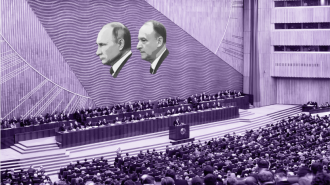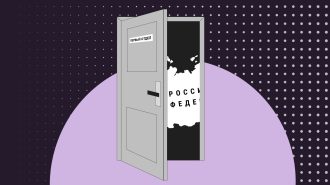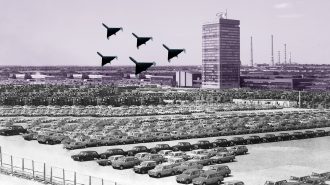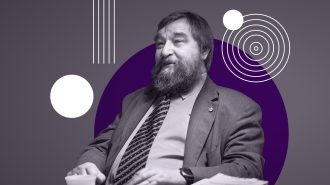In November 2024, the Prosecutor General's Office of the Russian Federation recognized the International Association of Intellectual Games (IAIG) as an undesirable organization. This absurd, at first glance, decision was preceded by a long history of ethical transformation and split of the once united intellectual community. Today, this confrontation looks like it was caused by a war, and everyone writes about it. However, it is based on deep contradictions and psychological deformations that have been embedded since Soviet times.
Russia
Today one can hear more and more often that Russia in the coming decades will live under "eternal Putin". The political regime is stable, the economy shows stability. Will the country turn into the USSR 2.0 or into an "orthodox Iran"? Are there prerequisites for regime change in Russia? T-invariant spoke to Andrei Yakovlev, a well-known economist and associate researcher at the Davis Centre at Harvard University.
Viktor Sadovnichy, the 85-year-old rector of Moscow State University, has been reappointed for a seventh term. This is not quite a typical situation: today the average age of a rector is under 60. T-invariant has studied the biographies of the heads of Russian universities in detail and realised that the problem with the rector corps is different: it is remarkably monotonous, as if they have specially selected people according to the average statistical pattern. Both the rector of Moscow State University and the heads of unremarkable regional universities have similar biographies and typical careers.
St. Petersburg State University was the first Russian university to ban its employees from publishing in international open access journals published by Elsevier. There are good reasons for this: as Elsevier told T-invarinat, the funds received from Russian authors are indeed sent to Ukraine.
"The Troitsk excavation under threat", "The last chance to learn our history", "Archaeologists ask for help " - only a small part of the publications that appeared this autumn. Fears of losing ancient Novgorod literatures are connected with the construction of the historical and archaeological centre, which is due to start this year.
Students of the "School of District Anti-Corruption" together with Groza and T-Invariant studied the composition of expert councils at the Ministry of Education and Science of the Russian Federation. It turned out that more than 10 per cent of the experts who influence decision-making "on the most important issues of the ministry's activities" are plagiarists and violators of academic ethics.
Over the two and a half years that the war in Ukraine has been going on, more than two thousand scientific articles dedicated to the "special military operation" have been published in Russia. Among them are some that have almost no relation to science, as well as quite professional studies by Russian scientists in the fields of law, psychology, sociology, and military affairs. T-invariant has read these articles and tells us what they are about.
T-invariant is starting a series of materials about the state of the supercomputer industry in Russia and the world. Today we will tell you about the brightest player in this small but strategically important market — the company T-Platforms and its founder — Vsevolod Opanasenko, who has been living under a criminal case for the last five years.
This summer, Vladimir Zvonovsky and Alexander Khodykin published a book “Russian Public Opinion in the Conditions of Military Conflict.” T-invariant spoke with Doctor of Sociological Sciences Vladimir Zvonovsky about the results of the study.
Tomsk State University graduated the first masters of the pilot program "Legal Linguistics". As graduation theses, students defended a portfolio of linguistic research and expert assessments on real criminal and administrative cases.
At the end of June, acting Rector of the Russian State University for the Humanities named Andrey Loginov, ex-Deputy Minister of Justice of Russia. This happened against the backdrop of a public scandal around the “Higher Political School” named after Ivan Ilyin, headed by Alexander Dugin, created at the university. T-invariant analyzed Loginov’s biography and found that he has no less importance than Ilyin and Dugin, grounds to claim the title of the main ideologist of the “Russian world”.
At the beginning of March 2022, graduate students of the European University in Florence Emil Kamalov and Ivetta Sergeeva, political scientist Margarita Zavadskaya and sociologist Nika Kostenko launched a sociological project OutRush, during which they surveyed three waves of those who left. Who are these people, what do they do, what do they think about returning home, what do they hope for? Nika Kostenko, a researcher at Tel Aviv University, talks about the results of the T-invariant study.
Even before the war with Ukraine, about 150 young Russian scientists became Fulbright scholarsand got the opportunity to study at American universities. In March of this year, the IIE and Cultural Vistas organizations sponsoring the program were declared undesirable in Russia. T-invariant looked into what awaits fellows in their home countries and what alternatives young scientists see for themselves.
Vladimir Putin updated and expanded scientific council at the Security Council of the Russian Federation. T-invariant analyzed the biographies of all its 174 members. The median age of the council is pre-retirement, 63.5 years. The oldest member is 94 years old.
T-invariant opens a series of publications related to the second anniversary of the war with Ukraine. In the first investigation, we tell how the FSB of the Russian Federation launched the largest “case of scientists” in modern Russia, pursuing the signatories of an anti-war letter throughout the country.
In Togliatti, in the local special economic zone (SEZ), they can build another plant for the assembly of Iranian combat drones. There is no official information about this and in words the plans are purely peaceful. The EFKO group of companies, the founder of enterprises producing drones in Tolyatti, pretends that it has nothing to do with the plant. T-invariant looks at how this big business moved from projects with GM and Volkswagen to assembling deadly machines for the war in Ukraine.
The Russian Federation's leading specialist in supercomputer systems was first checked by the FSB “for treason”, then kept under house arrest for six months on suspicion of “financing an extremist organization”. After fruitless attempts to plant according to the proven Soviet tradition, the “fool” is used. Sergei Abramov, corresponding member of the Russian Academy of Sciences, founder of a number of innovative companies, is planned to be sent to a psychiatric hospital for three weeks on November 30 for “conducting an inpatient examination.”Because the outpatient motivation of the scientist who organizes the supercomputer forum in Pereslavl-Zalessky, even while under investigation, the FSB could not understand even after eight months.
The Special Economic Zone (SEZ) "Alabuga", which has already hit the pages of all the world's media this year with a series of high-profile scandals, this time swung at the solar system and acted as a collective Ostap Bender for all the money - namely 491 trillion rubles . Leading Russian astrophysicists responded by recalling the gravitsappa on the Yubileiny satellite (a loud anti-scientific failure of Roscosmos from 2008).



















